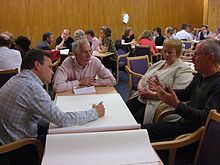World café (conversation)

A world café is a structured conversational process for
Knowledge café
A knowledge café, as developed by David Gurteen, has small tables, and a single open ended-question for all of the groups to discuss. The aim is to maximise time spent in conversation, so that time spent with any one person presenting is minimised. Discussion at each table is open and there is no formal attempt to capture what is said—the value is in the conversation itself.[7]
Modified world café
Modified world café is a variant developed in 2019 and structured in two rounds which have the same length and an equal number of tables. Each group is provided with a goal to work on and each round is ended by plenary presentation. After the intermediate presentation, all members of each group except one (called the "host") are asked to move their seats to a new table and start a new round of discussion that is concluded by a final plenary presentation.[8]
Application in Japanese clinical clerkship and postgraduate (residency) clinical teaching showed a relevant increase of the perceived usefulness and consent in respect of the product of the discussion groups.[8]
See also
- Art of Hosting
- Bohm Dialogue
- Dialogue
- Dialogue mapping
- Fishbowl (conversation)
- Learning circle
- Open Space Technology
- Participation (decision making)
- Public consultation
- Speed geeking
- Unconference
References
- ISBN 978-90-5130-506-7.
- ISBN 978-0-7914-7646-8.
- ISBN 978-0-7879-8643-8.
- ISBN 978-1-119-99621-7.
- ISBN 978-1-4471-4875-3.
- ^ Hartman, Ben (10 September 2011). "Round table discussions held in cities across Israel". The Jerusalem Post.
- ^ Gurteen, David (2008). "How to run a Knowledge Café". Gurteen. Retrieved 15 February 2017.
- ^ .
Further reading
- OCLC 50955069.
- Brown, Juanita; Isaacs, David; The World Café Community (2005). The World Café: Shaping Our Futures Through Conversations That Matter. Berrett-Koehler Publishers. pp. 96–98. OCLC 56876852.
- Brown, Juanita; Homer, Ken; Isaacs, David (2007). "The World Café". In Holman, Peggy; Devane, Tom; Cady, Steven (eds.). The Change Handbook: The Definitive Resource on Today's Best Methods for Engaging Whole Systems (2nd ed.). San Francisco: Berrett-Koehler Publishers. pp. 179–194. OCLC 66527256.
- Gronau, Norbert (2002). "The Knowledge Café: A Knowledge Management System and Its Application to Hospitality and Tourism". Journal of Quality Assurance in Hospitality & Tourism. 3 (3–4): 75–88. S2CID 154402005.
- Kazi, Abdul Samad (2004). Knowledge Management in the Construction Industry: A Socio-Technical Perspective. Hershey, PA: IGI Global. p. 61. OCLC 56065494.
- Pasher, Edna; Ronen, Tuvya (2011). The Complete Guide to Knowledge Management. Hoboken, NJ: John Wiley & Sons. pp. 112–114. OCLC 656770760.
- Senese, Mara (2012). "The World Café: Active Involvement Through Meaningful Conversation". In Klev, Roger; Levin, Morten (eds.). Participative Transformation: Learning and Development in Practising Change. Farnham; Burlington, VT: Gower. pp. 159–. OCLC 769546106.
- Singh, Shawren (2015). "Innovation through conversation: the use of Knowledge Café in the public sector". In Ramjugernath, Deresh (ed.). ICIE 2015 3rd International Conference on Innovation and Entrepreneurship. Academic Conferences Limited. pp. 191–193. ISBN 9781910309919.
- Skyrme, David (2001). Capitalizing on Knowledge: From E-Business to K-Business. Oxford; Boston: Butterworth-Heinemann. pp. 125–. OCLC 46512211.
- Steier, Frederick; Brown, Juanita; Mesquita da Silva, Flavio (2015). "The World Café in Action Research Settings". In Bradbury, Hilary (ed.). The Sage Handbook of Action Research: Participative Inquiry and Practice (3rd ed.). London; Thousand Oaks, CA: Sage Publications. pp. 211–219. OCLC 915115903.
- Yendol-Hoppey, Diane; Dana, Nancy Fichtman (2010). Powerful Professional Development. Thousand Oaks, Calif.: Corwin Press. pp. 83–. OCLC 464584714.
External links
- The World Café website
- The World Café Community website (by subscription)
- The Knowledge Café website
